
-
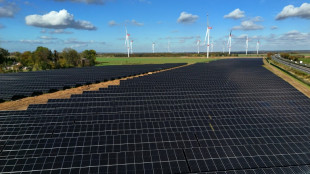 Solar power surpasses coal in EU for first time
Solar power surpasses coal in EU for first time
-
Musk, Wikipedia founder in row over how to describe 'Nazi salute'

-
 Axel Rudakubana: troubled teen whose knife rampage shocked Britain
Axel Rudakubana: troubled teen whose knife rampage shocked Britain
-
Sasaki vows to 'give best' to fire-torn LA at Dodgers unveiling

-
 UK teen faces sentencing over murders that sparked riots
UK teen faces sentencing over murders that sparked riots
-
Larry Ellison, tech's original maverick, makes Trump era return

-
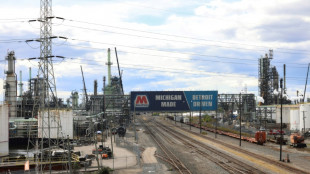 Trump push to 'drill, baby, drill' may hit industry roadblock
Trump push to 'drill, baby, drill' may hit industry roadblock
-
Instagram courts TikTok stars during turbulent times
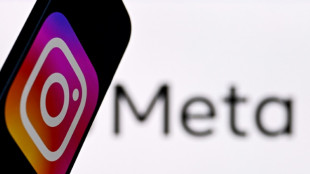
-
 Political crisis hits South Korea growth: central bank
Political crisis hits South Korea growth: central bank
-
Elephants are not people, US judges say
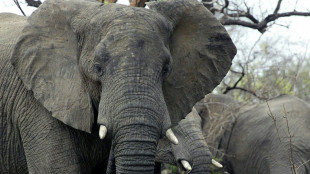
-
 Sinner aiming to be 'better, stronger' in Australian Open semi
Sinner aiming to be 'better, stronger' in Australian Open semi
-
Mass evacuations after explosive new fire erupts near Los Angeles

-
 Guardiola concedes Man City 'could not cope' with PSG as European hopes flicker
Guardiola concedes Man City 'could not cope' with PSG as European hopes flicker
-
PSG push Man City to brink with stunning Champions League comeback

-
 Arteta wants sunshine break as Arsenal move towards last 16
Arteta wants sunshine break as Arsenal move towards last 16
-
PSG comeback floors Man City as Arsenal near Champions League last 16

-
 Trump toughens crackdown on immigration and diversity
Trump toughens crackdown on immigration and diversity
-
Celtic make 'little bit of history' with Champions League progress

-
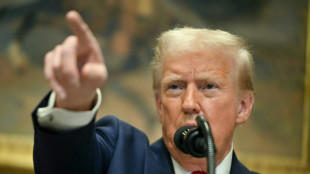 As Trump declares 'Gulf of America,' US enters name wars
As Trump declares 'Gulf of America,' US enters name wars
-
Celtic make Champions League progress thanks to Young Boys own goal

-
 Trump's tariff threats are 'leverage,' says informal economic advisor
Trump's tariff threats are 'leverage,' says informal economic advisor
-
Trump halts refugee arrivals in crackdown

-
 Gangs could overrun Haiti capital if aid falls short: UN chief
Gangs could overrun Haiti capital if aid falls short: UN chief
-
PSG sink Man City with stunning Champions League comeback

-
 Leao sinks Girona and pushes Milan into Champions League top eight
Leao sinks Girona and pushes Milan into Champions League top eight
-
Feyenoord stun toothless Bayern in Champions League

-
 Arsenal on course for last 16 after beating Dinamo
Arsenal on course for last 16 after beating Dinamo
-
Real Madrid thrash Salzburg to get back on Champions League track

-
 Les Paul owned by guitar god Jeff Beck auctioned for over £1 mn
Les Paul owned by guitar god Jeff Beck auctioned for over £1 mn
-
Colombia moves to arrest guerrilla leaders behind wave of violence

-
 New explosive wildfire erupts near Los Angeles
New explosive wildfire erupts near Los Angeles
-
Valladolid say Man City tapped up young star

-
 Fear abounds as M23 fighters close in on DR Congo's Goma
Fear abounds as M23 fighters close in on DR Congo's Goma
-
Sabalenka, Swiatek eye final showdown at Australian Open

-
 Musk bashes Trump-backed AI mega project
Musk bashes Trump-backed AI mega project
-
Hundreds to wed as Thai same-sex marriage law comes into force

-
 Musk seeks Trump pardon for 'Bitcoin Jesus,' charged with fraud
Musk seeks Trump pardon for 'Bitcoin Jesus,' charged with fraud
-
Shakhtar deal blow to Brest's Champions League last-16 ambitions

-
 What would Trump tariffs mean for key trade partner Mexico?
What would Trump tariffs mean for key trade partner Mexico?
-
Does China control the Panama Canal, as Trump claims?

-
 Trump tells Putin to make Ukraine deal 'now' or face tougher sanctions
Trump tells Putin to make Ukraine deal 'now' or face tougher sanctions
-
Yemen's Huthis say freed detained ship's crew after Gaza truce

-
 Mel B, Trump and Milei: What happened at Davos Wednesday
Mel B, Trump and Milei: What happened at Davos Wednesday
-
Spain's Sabadell bank to move HQ back to Catalonia

-
 Wembanyama returns to Paris for NBA games as a global star
Wembanyama returns to Paris for NBA games as a global star
-
Fashion world 'afraid' of Trump, says Belgium's Van Beirendonck

-
 Besiktas romp to victory over Athletic in Solskjaer's first game
Besiktas romp to victory over Athletic in Solskjaer's first game
-
'Best feeling' as Hamilton drives first laps for Ferrari

-
 Argentina's Milei says would leave Mercosur for US trade deal
Argentina's Milei says would leave Mercosur for US trade deal
-
Musk slams Trump-backed AI mega project

| RBGPF | 0.26% | 62.36 | $ | |
| SCS | -1.9% | 11.58 | $ | |
| GSK | -1.05% | 33.43 | $ | |
| CMSD | -0.17% | 23.96 | $ | |
| NGG | -2.56% | 60.05 | $ | |
| VOD | -2.03% | 8.38 | $ | |
| RELX | -0.59% | 49.26 | $ | |
| BTI | -0.44% | 36.57 | $ | |
| CMSC | -0.26% | 23.49 | $ | |
| RIO | -1% | 61.12 | $ | |
| RYCEF | 2.02% | 7.42 | $ | |
| BCE | -1.04% | 23.15 | $ | |
| BCC | -0.94% | 127.92 | $ | |
| JRI | -0.32% | 12.53 | $ | |
| BP | -1.25% | 31.13 | $ | |
| AZN | 0.35% | 68.2 | $ |

S. Korea chooses new president with inequality key concern
South Koreans will vote for a new president Wednesday with economic inequality a top concern despite growing sabre-rattling from the nuclear-armed North.
Record early voting indicates turnout will be high after a campaign dominated by mud-slinging between liberal Lee Jae-myung and conservative Yoon Suk-yeol.
The pair have been neck-and-neck in the polls for months, with around 90 percent of the electorate supporting one or the other.
Analysts say South Korean politics is particularly adversarial, with democracy only restored in 1987 after decades of authoritarian rule.
Presidents serve just a single term of five years, and every living former leader has been jailed for corruption after leaving office.
Yoon has already threatened to investigate outgoing President Moon Jae-in, citing unspecified "irregularities".
Polling stations open at 6 am (2100 GMT) and shut at 6 pm. For 90 minutes after closing, Covid-positive voters will be allowed to cast their ballots.
South Korea is in the grip of an Omicron wave with more than 200,000 new cases being recorded on most days this month.
More than a million people are currently isolating at home after testing positive, health authorities say. The country amended its electoral laws last month to ensure they would be able to vote.
In a two-day early voting exercise last week, a record-breaking 37 percent of the 44 million people eligible cast their ballots -- the highest number since the system was introduced in 2013.
Polls show the top concerns among the electorate are skyrocketing house prices in the capital Seoul, rising domestic inequality and stubborn youth unemployment.
The new president will also have to confront an increasingly assertive North Korea, which has embarked on a record-breaking blitz of weapons tests this year including a launch just days before the election.
- 'Tone deaf' -
Lee, a former child factory worker turned politician, has offered a slew of fresh policies from a universal basic income to free school uniforms -- but his ideas have been overshadowed by media coverage of scandals.
The 57-year-old is under pressure over a controversial land development deal in which private investors profited from a state-funded project on Lee's watch as mayor of the city of Seongnam.
He was also forced to start his campaign by apologising for a profanity-laden phone call with his family involving disputes with his late brother and mother.
His conservative rival Yoon has called for a relaxation of labour regulations including a lowering of the minimum wage and the removal of limits on working hours.
The former top prosecutor is also promising to abolish the gender equality ministry, saying South Korean women do not suffer from "systemic gender discrimination", despite evidence to the contrary.
Yoon has made a series of gaffes on the campaign trail including most recently with a tweet on Ukraine in which he posted a tangerine with an angry face in a bizarre reference to the country's Orange Revolution of 2004.
Critics described the tweet as "tone deaf".
The winner of the election will formally succeed Moon in May. The incumbent remains popular, despite not achieving a promised peace deal with North Korea.
R.Garcia--AT
